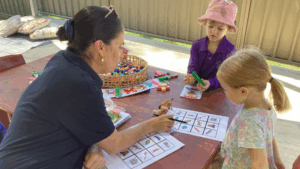In their words: The power of Early Childhood Hubs
A research report sharing insights from families, practitioners and service leaders on how Early Childhood Hubs help children, families and communities thrive.
SVA set out to better understand and elevate the lived experiences of children, families and practitioners engaged in Early Childhood Hubs (ECHs). The research explores what families and practitioners value most, offering insights to strengthen best practice and improve how hubs meet the needs of children and families. These insights will also help guide advocacy for stronger supports and the expansion of hubs in areas of greatest need.
To do this, SVA partnered with The Australian Centre for Social Innovation (TACSI) to undertake a national storytelling project. Together, we visited five hubs across Australia and spoke with over 17 families and 20 staff to hear directly about the role hubs play in people’s lives.
What are Early Childhood Hubs?
Early Childhood Hubs are places where children and their families can go to access key services and connect with other families. They provide a range of child and family services including early learning programs, maternal and child health and family support programs, as well as tiered services for families who need them.
What we learned
Families described hubs as life-changing places that nurture the wellbeing of the whole family. Hubs were seen as safe, welcoming “one-stop-shops” that combine play, learning, health, social work, and community connection – making it easier for families to access support without retelling their stories multiple times.
Families highlighted the importance of early, ongoing, and non-judgemental help, flexible wrap-around support, and staff who walk alongside them through crises and everyday challenges.
For families facing housing, health, education or employment challenges, fragmented systems often make it harder to get the help they need. As trusted navigators, hubs help bridge these gaps, easing both the emotional and practical burden of navigating complex systems.
We found that hubs are often achieving this impact while operating within complex, fragmented systems and managing short-term, inflexible funding arrangements. Practitioners emphasise that sustaining and scaling success requires long-term, flexible investment, culturally responsive practice, and relational, community-led approaches that lower barriers, foster belonging and build lasting trust.
The full report brings together patterns of what works, lived-experience stories, journey maps, and community-level outcomes – showing how hubs become community anchors, not only delivering better outcomes for children and families, but strengthening entire communities.
Read the summary brief Watch the webinar



